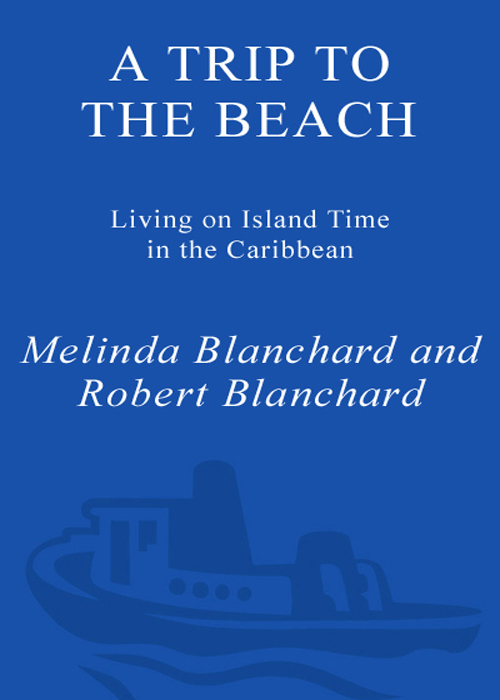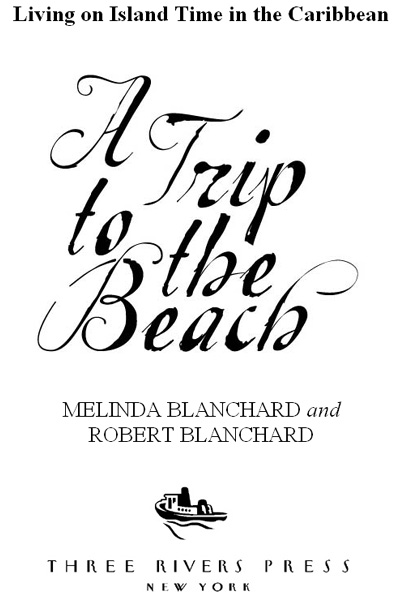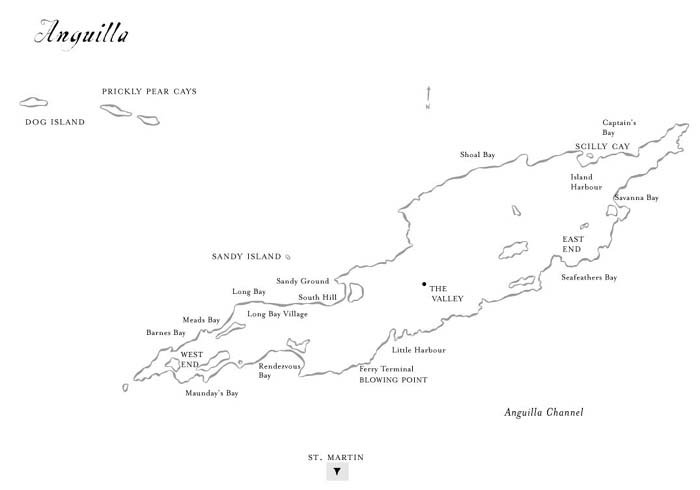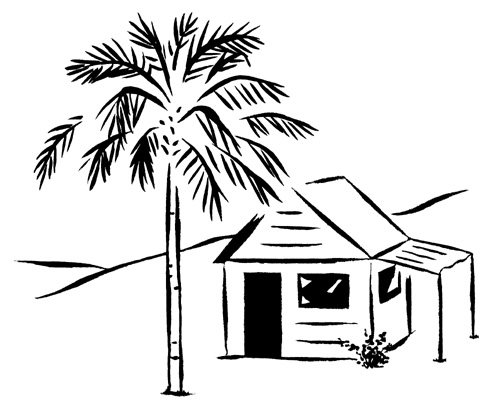A Trip to the Beach



Contents
This book is dedicated with all our love to Jesse

Author's Note
The following is a true story, and although some names have been changed, the characters are real. Conversations are written as accurately as we can remember them and are not intended to be exact quotations. In the course of our lives together we have had eight businesses, ranging from retail stores and food manufacturing to mail-order catalogs and restaurants. The sequence of events in this book took place over a span of ten years and two restaurants in Anguilla. We have taken the liberty of condensing the time frame so as to capture the spirit of life in Anguilla and give the reader a feeling of the different seasons on the island.
Acknowledgments
The people of Anguilla hold a very special place deep in our hearts. With enormous gratitude, we thank you all for changing our lives and letting us become a part of yours. Special thanks to Lowell Hodge, Clinton Davis, Miguel Leverett, Garrilin Nisbett, Renford “Bug” Gumbs, Ozzie Rey, Alwyn Richardson, Huegel Hughes, and Winston “Shabby” Davis. Thanks also to Joshua Gumbs, Evelyn Gumbs, Jeremiah Gumbs, Bennie Connor, Claude Richardson, Eustace Guishard, the crew of
De Tree,
and the Government of Anguilla. To all the concierges and taxi drivers who have sent us business over the years, please accept our heartfelt appreciation. We offer our sincere apologies to our Anguillian friends who are not mentioned; you are very important to us as well, but there just wasn't room for everyone.
We are deeply grateful to our agent and dear friend, Michael Carlisle, for helping us from concept to completion. Without Michael, this book would not have existed, and we would have missed one of the most wonderful experiences of our lives. Special thanks to our editor, Annetta Hanna, whose support, understanding, and vision kept us on track throughout. Her magical ability to make rewriting painless, and in fact enjoyable, made this project a pleasure. Many thanks to everyone at Clarkson Potter for their boundless enthusiasm: Lauren Shakely, Vanessa Hughes, Margot Schupf, Marysarah Quinn, Barbara Marks, Leigh Ann Ambrosi, Caitlin Daniels, Debbie Koenig, Maha Khalil, Jennifer Stallone, Andrea Rosen, and everyone else behind the scenes who made the process of publishing a sheer delight.
Our great thanks to the many friends whose readings and input were invaluable: Betsy Siebeck, Libby and Peter Robbie, Pat Merrill, Susan Harris, Sally Peterson, Nina Freedman, Michael Rosenbaum, Jane and Jim Harmon, Joan Kron, Richard and Melinda Stucker, Hilary and Ethel Lipsitz, Maggie Orem, and of course, Jesse.
We are grateful to Michael and Judy Steinhardt, Milt and Carolyn Frye, Edgar Bronfman Sr., Dave Cioffi, Penny McConnel, and Susan Pierres for their support. Many thanks also to Joel Chusid at American Eagle for always finding Jesse a seat at Christmastime, Leon and Nigel Roydon for years of advice on doing business in Anguilla, Sheila and Sherm Haskins and the staff at Tropical Shipping for efficiently delivering boatloads of supplies from Miami, Rachel Klayman and David Edelstein for helping us find our voice, Marvin Shanken at
Wine Spectator
magazine, and all of our loyal customers who have dined with us over the years.
Chapter 1

From the air Anguilla looked narrow, flat, and scrubby, but that was only part of the picture. In my mind, I saw the real Anguilla: sea grape and crimson flamboyant trees, women steadying pails of water on their heads, sand that might have been poured from a sack of sugar, the cool terra-cotta floors of the Hotel Malliouhana. The sunshine alone was enough to make me smile. Stepping off the plane, I felt the breeze from the east, scented by the hibiscus that grew alongside the terminal. Those cool currents made the sun seem unthreatening. Poor Bob, with his fair complexion, would be pink in a matter of minutes.
In Anguilla it is customary to greet everyone with a courtly “Good morning” or “Good afternoon.” As we approached the young woman at the immigration counter, we were greedy enough to hope for more. We'd seen her many times on our visits to the island. We wanted to be recognized, to be told that we were different from mere touristsâconnected.
“Good afternoon,” the young woman said, smiling. “Welcome back.” Anguilla had begun to cast its spell.
As our taxi made its way westwardâslowing for potholes, speed bumps, people, goatsâI counted the ways I loved this little island. Unlike its neighbors, Anguilla (rhymes with
vanilla
and pronounced
Ann-gwilla
) had no casinos, no duty-free shopping, and no cruise ships. Visitors here looked for less, not more. They tended to arrive one or two at a time and not in packs. Their intentions were simple: to walk on the beach, go snorkeling, read a good book, take a dip in the water. They'd found a place where handmade signs beckoned them to Easy Corner Villas, Sandy Hill, and Blowing Point. Drawn to this tiny British outpost only sixteen miles long, they appreciated the rhythm, the balmy pace. Little schoolgirls in handmade uniforms skipped along the road, holding hands.
The idyllic life on Anguilla isn't an illusion manufactured for tourists. The island's standard of living is higher than its neighbors'. No gambling means no gambling problems. Limited work permits for outsiders ensures plenty of jobs for locals. This is a country with no taxes, where a dollar earned is an actual dollar. There is no unemployment, and eighty-five-degree temperatures with sunshine almost every day. Life is good.
There are several world-class hotels on the island, all criminally luxurious. Over the years we had alternated between them, savoring their brands of exquisite tranquillity. One, Cap Juluca, boasts villas with Moroccan-style domes, and bathrooms so vast that they have their own gardens. Another, Malliouhana, was createdâand is lovingly cared forâby a retired English gentleman whose lifelong dream had been to preside over such a hideaway. Here life is serene, with white stucco arches, ceiling fans that seem to lull away one's cares, and a breathtaking view of the clear turquoise water from the top of a cliff.
Our taxi driver, Mac Pemberton, had driven us around the island many times, but that day was different. He had called us in Vermont with urgent news. We had spoken about opening a beach bar in Anguilla, and he had promised to help find us a spot. Now he had scheduled a meeting for us to meet Bennie, the landlord of an abandoned restaurant.
It wasn't a notion from the blue. Many years earlier, when Jesse was five, Bob and I had taken him to Barbados, where we'd spent a wonderful morning hunting conch shells and building an enormous sand castle complete with moat. By the time we finished we were ravenous, but there were no restaurants in sight. So we set off down the beach. We were all three healthy and brown with sun; even Bob had gotten past the sunburn stage. Jesse danced in and out of the surf, laughing at nothing and everything. I felt preposterously lucky. A good meal would complete the experience.
After about a mile we spotted a picnic table. A short distance away was a man leaning back in a beach chair, his feet propped up on a giant cooler, his head buried in a thick, tattered paperback. Above him was a small thatched roof with a blackboard sign.
HAMBURGERSâ$10.00
LOBSTERâ$25.00
BEER AND SODAâ$4.00
It was like finding a lemonade stand in the middle of the desert. We stood in front of the man and smiled expectantly, but he must have been intent on finishing his page, because it took him a minute to acknowledge us. When he was ready, he slowly swung his feet off the cooler and looked up.
“Hungry?”
Jesse was the first to respond. “Starving. What do you have?”
With his head, the man gestured at the menu on the blackboard. He seemed eager to get back to his book, which I saw now was
Moby-Dick.
After a hasty conference, we ordered three burgers, two Cokes, and a beer. We handed him a wad of bills and in return received our drinks, three raw hamburger patties, and a long pair of tongs. Then he motioned toward a fifty-five-gallon oil drum that had been cut in half lengthwise with a torch, propped up on several lengths of steel pipe, and filled with hot coals. We realized we were about to cook our own lunch.
“We just paid forty-two dollars for a lunch that must have cost that guy five bucks,” said Bob, standing over the grill. “And we have to cook it ourselves.” His grumbling was mixed with admiration.
One bite was all it took to change our mood. “This is the best hamburger I've ever had,” Jesse declared. We all agreed.
I marveled at the ingenuity of the setup. A secluded spot, sand like flour, customers arriving in bathing suits. The guy barely lifted a finger, cleared at least $35, and gave us a lunch we'd remember foreverâan experience that seemed to me to rival the best white-tablecloth meals we had eaten in Paris. The man reading
Moby-Dick
had sold us a frame of mind.
When Mac called, he insisted we had little time to waste. We caught only bits and pieces of his excited conversationâ“restaurant closed,” “great location,” “bank repossession,” “get down here immediately.” It was far from a sure thing, but if we could work it out, it would mean moving to Anguilla. We had already decided to start again from scratch, and this could be our chance. No more snowstorms. No more speed dial.
We drove right to the site before checking into the hotel. Mac parked his van in front of a deserted shack, and we followed him over vines and scrubby bushes covered with prickles. It took only a minute before we found ourselves on the familiar beach at Meads Bay. To the right was Carimar Beach Club, and Malliouhana, on the cliff, was practically next door. To the left was nothing but white sandy beach for almost a mile, then several small hotels bordered by dunes covered with sea grape. The sun was high in the sky and reflected off the water like a string of sparkling diamonds. It was a picture postcard spot. I could envision a tiny restaurant here.
Minutes later we were on our Malliouhana balcony, only twenty-four hours after Mac's call, watching pelicans dive for fish. My shoulders had already softened, and I felt an urgent need to make a list of things we might do just in case the beach bar didn't work out. There were still many obstacles to overcome. Taking over a repossessed restaurant in a third-world country seemed like a long shot. I seized a sheet of the hotel's embossed stationery and summarized our position.
“We have
some
money,” I said. “Granted, not as much as we should after selling Blanchard & Blanchard.”
At the mention of Blanchard & Blanchard, Bob stood and walked to the suite's minibar, and my mind drifted back to the events leading up to the sale.
There had been as many friends warning us not to start Blanchard & Blanchard as there were regarding our decision to move to a Caribbean island. I could still hear them. “Start a specialty food company in your house in Vermont? Make what? Salad dressings, fudge sauce, mustards? Why? Do you know how to do that?” We were asked all kinds of questions regarding our sanity. The fact that we had only $4,000 to begin with came up often.
We chose to ignore their advice, and in almost no time we had over a thousand accounts across the country. We had built a large factory where endless rows of bottles were whisked along stainless-steel conveyor belts and huge machines filled, capped, labeled, and prepared them for sale.
Our lives would have been different if one of our largest accounts hadn't suddenly defaulted and if we hadn't been forced to make a hasty deal to keep from bouncing all our checks. We brought in two New York investors who saved the day.
As the popularity of our products spread, we began doing business with supermarkets and were, in turn, thrown out of our prestigious accounts, like Bloomingdale's and Macy's. Selling to supermarkets is like dating Darth Vader. It's a world of deal making, discounts, and payoffs. We found ourselves in the back rooms of places like Piggly Wiggly, haggling over pennies with fleshy men in gold chains and pinky rings. And as the business grew, our share mysteriously became smaller and smaller.
“Relax,” said our partners. “You have a smaller piece of a bigger pie.”
Sitting at our dining room table on the night we finally yielded to pressure to sell our shares for a fraction of their worth, Bob shook his head. “I'll never think of pie the same way again,” he said sadly. “And I've always loved pie.”
“We need to focus,” I said impatiently. “I can't relax and pretend we're on vacation when we have no income and a sketchy plan.”
“We've only been here an hour,” said Bob. “Give me at least another minute before I have to decide what to do with the rest of my life.”
Bob joined me at the round table on the balcony, carrying a half bottle of merlot. “End of relaxation,” he announced. He poured a little wine into his glass and savored its bouquet.
“We have a good plan,” he insisted. “This is going to work out. We're moving to Anguilla.”
“Well,” I said skeptically, “I'd feel better if we had some alternatives. Can we just look at our options? The only thing I'm absolutely sure of is whatever we do, it's just you and me. No partners.”
“No partners,” said Bob, raising his glass in a toast. He sniffed and sipped. “I don't even care about making a lot of money anymore. I just want a small business without all the stress. Just you and me sounds good.”
“If this doesn't work out,” I said, “the only other thing we've talked about is building an inn in Vermont and living happily ever after as gracious hosts.”
“The retirement fantasy of every investment banker,” said Bob.
I asked if he had other suggestions.
“No, it's a great fantasy,” he said. “And we'd do it better than a banker. We'd create the perfect Vermont experience. The rooms would be rustic, so you know you're in the country, but they'd have every luxury you could want. Great food, walking paths through the woods, apple orchards, a pond . . .”
“Sounds like a Vermont version of Malliouhana.”
“Yes, it does,” he said wistfully. “This is a pretty good model.”
The more he talked, the more heady he got. Sheep grazing in the field. A horse barn. “We could make maple syrup and let the guests gather sap from the trees,” he said. “Then they'd carry it in buckets to the sugar houseâa small one, maybe with a woodshed on one end. They could help boil it down to syrup, then put it in a bottle and stick on a handwritten label that says MAPLE SYRUP BY ETHEL SMITH.”
“Bob,” I said gently, trying to summon him back to earth, “I don't want to say it's impossible, but do you think we have enough money for a project on that scale? We couldn't afford the land, let alone the inn or theâ”
“Sugar house.”
“It's a very sweet idea. Maybe someday . . .”
Bob nodded. He was still worried about our future, but an element of playfulness had crept into his voice; the juices were flowing. He gazed steadily at the tiny boats off the shore.
“If the restaurant doesn't work out,” he declared suddenly, “we'll make Caribbean sauces, sell them to tourists. There are plenty of tourists,” he said. “Tourists want sauce. It could be a Caribbean version of Blanchard & Blanchard.”
We both stared apprehensively at the pelicans, wondering how many jars of mango salsa we would have to sell to cruise ships to afford Jesse's tuition. He was in an expensive college and on the ski teamâthe world's highest-priced extracurricular activity. Bob drained his glass.
“It doesn't matter what we do,” he concluded. “Let's just find a way to do it here.”
“We have to call Joshua,” Bob said. “He'll have some good advice.”
Joshua Gumbs. Our first taxi driver in Anguilla years before. The man who'd regaled us with stories about the island in his rumbling baritone, taught us the local patois, and invited us to Sunday dinner with his familyâa rare privilege for outsiders. It was unthinkable to consider moving to Anguilla without consulting Joshua.
He couldn't have been much more than sixty, but he and his wife had ten children and a slew of grandchildren. Joshua had worn many hatsâfisherman, taxi driver, landlordâand now supplied most of the island, including luxury hotels, with paper and cleaning supplies shipped by container from Miami. Joshua tended to preach, which could occasionally be trying, but most of what he said was indispensable. With no formal education, he was an entrepreneur as canny as any venture capitalist we'd ever met. And far nicer to spend time with.
